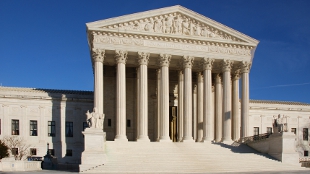 WIKIMEDIA
WIKIMEDIA
The United States Supreme Court has today (June 13) unanimously ruled that isolated human genes cannot be patented, but the Justices also ruled that synthetic DNA sequences—known as complimentary DNA (cDNA)—are eligible for protection. “A naturally occurring DNA segment is a product of nature and not patent eligible merely because it has been isolated,” wrote Justice Clarence Thomas, “but cDNA is patent eligible because it is not naturally occurring.”
The decision throws out patents held by Utah-based Myriad Genetics on two genes—BRCA1 and BRCA2—that when mutated cause breast and other types of cancer. Researchers, physicians, and patients who sued Myriad are claiming victory because the ruling means that the company no longer has a monopoly on diagnostic tests based on these two genes. This could ...













